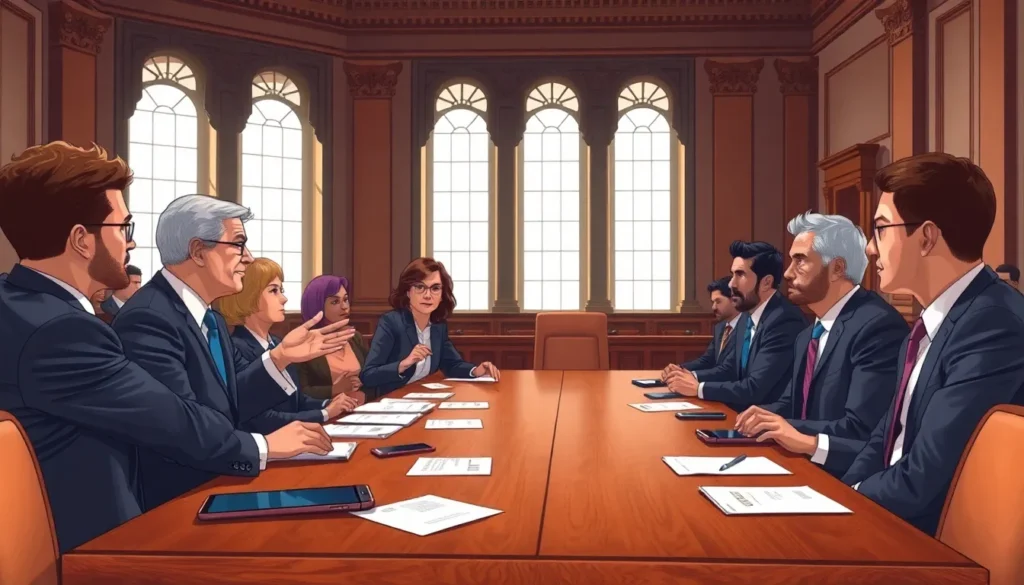In a world where political scandals often steal the spotlight, one question looms larger than life: can we trust our leaders? Political trust is more than just a buzzword; it’s the glue that holds society together. Without it, democracy feels like a game of musical chairs—only with fewer chairs and a lot more shouting.
As citizens navigate the murky waters of political promises and broken vows, understanding the dynamics of trust becomes crucial. It’s not just about believing in a candidate; it’s about believing in the system itself. So, grab your popcorn and settle in as we explore why political trust matters, how it shapes our lives, and what happens when it’s put to the test. After all, who doesn’t want to know if their vote actually counts?
Table of Contents
ToggleUnderstanding Political Trust
Political trust reflects citizens’ confidence in their <a href="https://bailoutbevin.com/which-is-the-best-example-of-the-process-through-which-public-policy-is-made”>government and the political system. It influences voter behavior, civic engagement, and the overall health of a democracy.
Definition of Political Trust
Political trust refers to the belief that governmental institutions act in the public’s best interest. This trust encompasses faith in elected officials, bureaucracies, and the political processes guiding decision-making. Established definitions underscore that political trust involves reliability, transparency, and accountability. When individuals perceive their government as responsive, they develop a stronger sense of trust. Conversely, distrust arises when citizens sense corruption or ineffectiveness within those institutions.
Importance of Political Trust
Political trust serves as a cornerstone for societal cohesion and effective governance. High levels of political trust encourage civic participation, promoting a vibrant democratic process. With increased trust, citizens engage more readily in elections and community initiatives. Research indicates that trust enhances compliance with laws and policies since individuals believe in their fairness and legitimacy. When trust diminishes, political instability can occur, leading to disengagement, protests, or violence. In summary, strong political trust fosters a healthy democratic society, while low trust can lead to significant challenges.
Factors Influencing Political Trust

Political trust hinges on several critical factors that shape citizens’ perceptions of governmental integrity and effectiveness.
Economic Conditions
Economic conditions greatly affect political trust. When economic stability exists, citizens often display higher levels of confidence in their government. Employment rates and inflation can influence public sentiment. Governments perceived as managing the economy well tend to enjoy increased trust. In contrast, economic downturns can erode this trust rapidly. High unemployment or rising costs of living can lead to disillusionment with political leaders. Citizens often hold elected officials accountable for their economic circumstances, which impacts voter behavior and civic engagement.
Government Transparency
Government transparency plays a vital role in fostering political trust. Clarity in decision-making processes promotes confidence among citizens. When information is readily available and freely shared, it reduces the perception of corruption. Transparency initiatives, such as open data policies, encourage public engagement and accountability. Citizens are more likely to trust governments that communicate openly about policies and actions. Secrecy or lack of information can lead to skepticism and distrust, making transparency essential for maintaining political stability and trust.
Media Influence
Media influence significantly shapes political trust. Coverage of governmental actions affects public perception directly. Positive media portrayal of government initiatives can enhance trust, while negative coverage can damage it. Social media platforms also impact how citizens engage with political information. Misinformation spreads quickly, leading to confusion and distrust. Balanced media reporting fosters informed electorates, while biased coverage may polarize opinions. Understanding media’s role in shaping political narratives helps clarify its impact on trust levels among citizens.
Measuring Political Trust
Measuring political trust involves various methodologies that provide insights into citizens’ perceptions of their government. Reliable data helps understand public sentiment and drive democratic processes.
Surveys and Polls
Polls and surveys serve as primary tools for quantifying political trust. Many organizations conduct these surveys to gauge public opinion on government performance. Typically, questions assess trust in institutions, leaders, and political processes. For example, Gallup frequently publishes findings on citizens’ trust in government, revealing trends over time. Data from these surveys can illustrate shifts in political trust correlated with significant events or changes in administration. Respondents’ experiences and satisfaction levels significantly influence these perceptions. High response rates enhance the credibility of outcomes, making surveys vital for researchers and policymakers.
Qualitative Assessments
Qualitative assessments provide in-depth insights into political trust. Focus groups and interviews enable researchers to explore citizens’ beliefs and concerns in detail. Participants often share personal experiences, shedding light on the factors impacting their trust levels. For instance, discussions around government transparency and accountability reveal strong emotional responses. Through narrative insights, researchers can identify specific reasons for declining or increasing trust. These assessments complement quantitative data, offering context and a richer understanding of political dynamics. Engaging directly with citizens allows for broader interpretations of trust and its implications for societal behaviors.
Consequences of Political Trust
Political trust significantly influences various societal dynamics. Its effects permeate governance and civic engagement.
Impact on Governance
Governance thrives on the foundation of political trust. Trust enables effective policy implementation, fostering collaboration among governmental institutions. Citizens exhibit higher compliance with laws when they believe their leaders prioritize the public’s interest. Research shows stable political trust correlates with enhanced government effectiveness. When citizens feel confident in their representatives, they are more likely to support necessary reforms. Additionally, transparency in actions reinforces trust, leading to better decision-making processes across agencies. Institutions operating under high levels of trust often enjoy increased legitimacy and authority in their initiatives.
Civic Engagement
Civic engagement flourishes in environments marked by political trust. When individuals feel assured their voices matter, they participate actively in the democratic process. Voter turnout often rises in contexts where political trust exists. Furthermore, trust encourages community involvement and volunteerism, creating a stronger civil society. In surveys, citizens expressing high trust levels report greater interest in local governance and initiatives. Engagement extends beyond voting; it encompasses voices in public meetings and advocacy for local issues. The interrelationship between political trust and civic involvement generates a more responsive and accountable democracy.
Enhancing Political Trust
Strengthening political trust involves several practical approaches. By implementing effective policies and prioritizing educational initiatives, governments can foster a more trustworthy political environment.
Policy Recommendations
Promoting transparency in government activities boosts public trust. Establishing independent oversight bodies enhances accountability and reduces corruption perceptions. Encouraging public participation in decision-making processes allows citizens to voice their concerns, further solidifying trust. Implementing regular feedback mechanisms provides opportunities for citizens to express their opinions on policies and governance. Strategies like open data initiatives empower citizens by making information accessible, encouraging informed engagement. Encouraging collaboration between government agencies and civic organizations can also build a community-based approach that reinforces trust.
Role of Education
Education plays a crucial role in fostering political trust. Civic education programs equip citizens with knowledge about their rights and responsibilities. Understanding political systems and processes enables citizens to critically evaluate governmental actions. Schools can introduce discussions about political trust, encouraging students to engage with democratic principles. Higher levels of education often correlate with greater political interest and participation. Additionally, informed citizens are more likely to hold officials accountable, further enhancing political trust. Promoting critical thinking skills in education empowers individuals to engage in political discourse constructively.
Political trust is vital for a thriving democracy. Its influence extends beyond mere confidence in leaders; it shapes civic engagement and the overall health of society. When citizens trust their government, they are more likely to participate actively in the democratic process and comply with laws.
To build and maintain this trust, transparency and accountability are essential. Initiatives that promote open communication and public involvement can significantly enhance citizens’ perceptions of their government. As the landscape of politics continues to evolve, fostering political trust remains crucial for ensuring a responsive and engaged citizenry. Emphasizing education and critical thinking will empower individuals to navigate the complexities of political systems, ultimately strengthening democracy for future generations.



